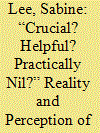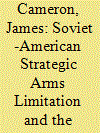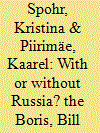|
|
|
Sort Order |
|
|
|
Items / Page
|
|
|
|
|
|
|
| Srl | Item |
| 1 |
ID:
188616


|
|
|
|
|
| Summary/Abstract |
When, in March 1940, two Jewish emigré physicists, Otto Frisch and Rudolf Peierls, composed a memorandum on the technical feasibility of an atomic weapon, few would have envisaged the significance of this six-page document. The technical blueprint for an atomic weapon, at the time assumed to be well beyond the realm of the possible, was to have a significant impact on the Anglo-American nuclear relationship, as it enabled British and American scientists to discuss at eye-level, the direction of nuclear weapons development, as it moved from theory to implementation. Significantly, Peierls and Frisch calculated the critical mass uranium and concluded that the amount of U235 required for a bomb was in the region of kilos rather than tons, as previously thought. The document amplified the British voice in the Anglo-American discussions about the development of nuclear weapons which eventually led to the Manhattan Project, the US-led development of the bombs that would be dropped on Hiroshima and Nagasaki to end the war in the Pacific. Yet, the official history of the Manhattan Project claimed that the British contribution to the successful development of the weapon was ‘in no sense vital’ and the ‘technical and engineering contribution … practically nil’. This paper discusses Britain’s co-operation and competition in the Anglo-American nuclear relationship in the light of scientific collaboration and rivalry during the Second World War.
|
|
|
|
|
|
|
|
|
|
|
|
|
|
|
|
| 2 |
ID:
188618


|
|
|
|
|
| Summary/Abstract |
State response to assassination conspiracies is a reality behind diplomacy. This examination analyses British and American responses to assassination from the late 1960s to the mid-1980s. It argues the United States and Britain began with very different cultures of assassination. The 1980s was a period of structural convergence driven by practical collaboration: it had little to do with a longstanding ‘special relationship’, the Second Cold War, or relations between Margaret Thatcher and Ronald Reagan.
|
|
|
|
|
|
|
|
|
|
|
|
|
|
|
|
| 3 |
ID:
188621


|
|
|
|
|
| Summary/Abstract |
This analysis revisits Britain’s reorientation towards Europe following its European Community [EC] membership during the 1970s and 1980s. Looking at British policy towards China, the United States, and key EC member-states, Britain tried to pursue its national interests from a distinctively European platform, and played an important part in the emergence of a coherent Western European voice on the international stage at the time. Yet the lack of an overarching European strategy, the ignorance of spill-over factors between different foreign policy areas, and the personal temperaments of Britain’s political leaders all meant that the European turn in British foreign policy was rarely visible to contemporaries and ultimately remained incomplete at best.
|
|
|
|
|
|
|
|
|
|
|
|
|
|
|
|
| 4 |
ID:
188615


|
|
|
|
|
| Summary/Abstract |
David Reynolds’s concept of ‘competitive cooperation’, advanced in his book The Creation of the Anglo-American Alliance: A Study in Competitive Cooperation, 1937–1941, has been highly influential in the historiography of contemporary international history. During his career Reynolds has enriched and developed the concept, pushing the bounds of the discipline to encompass insights from cultural and social history. He has also advanced well beyond his original Anglo-American focus, engaging with Russian and other European scholars to provide a broader and deeper understanding of both the Second World War and the Cold War era. He has proven himself similarly versatile in conveying insights reaped from the archives to a broader audience beyond academia through the mediums of television and radio. His work provides a model for what can be achieved through the fully rounded study of international history.
|
|
|
|
|
|
|
|
|
|
|
|
|
|
|
|
| 5 |
ID:
188619


|
|
|
|
|
| Summary/Abstract |
The Heath-Nixon years, 1970–1974, have been widely characterised as marking a low point in Anglo-American relations, even the end of the so-called ‘special relationship’. Overall, historians and commentators have tended to point the finger at Edward Heath, the British prime minister. As a committed Europhile, Heath is said to have deliberately downgraded relations with Washington in pursuit of membership of the European Economic Community [EEC], making the old habits of transatlantic co-operation impossible. Drawing on material from both sides of the Atlantic, this analysis presents a different perspective. Far from marking a transformation of British foreign policy, Heath’s determination to join the EEC stood as part of a longstanding effort to reinvigorate Britain’s place in the world, including the alliance with Washington. Moreover, when it came to diplomatic relations, largely, it was the nature of policy-making under President Richard Nixon – assisted by his chief advisor, Henry Kissinger – that undermined the old patterns of co-operation. As the White House set out to transform international relations, overhaul the global economic order, and impose its Cold War rivalry on regional crises, London was left feeling impotent, marginalised, and even double-crossed – all of which fuelled the case for Europe.
|
|
|
|
|
|
|
|
|
|
|
|
|
|
|
|
| 6 |
ID:
188620


|
|
|
|
|
| Summary/Abstract |
The United States and the Soviet Union concluded two sets of strategic arms limitation talks – SALT I and II – during the 1970s. Drawing on recent revisionist scholarship, this analysis assesses the success of SALT I and SALT II’s relative failure and I by framing Soviet-American strategic arms control in the 1970s as an exercise in co-operative competition, the pursuit of competitive strategies through nominally co-operative means. Whilst SALT I achieved a temporary balance between the co-operative and competitive elements of arms control, SALT II’s demise was in large part due to the fundamental contradictions at the heart of both superpowers’ use of strategic arms limitation as an instrument of co-operative competition. The analysis concludes by assessing the implications of this analysis for strategic arms control in a new era of great-power rivalry.
|
|
|
|
|
|
|
|
|
|
|
|
|
|
|
|
| 7 |
ID:
188617


|
|
|
|
|
| Summary/Abstract |
This analysis charts the emergence of a distinct British nuclear culture during the early post-war years and investigates the various forms of influence that the United States exercised on its development. Beginning with a disastrous breakdown of transatlantic nuclear co-operation in 1946, it establishes the true degree of sovereignty enjoyed by Britain’s nuclear engineers as they navigated a new relationship with a senior partner that acted simultaneously as a vital knowledge donor and commercial competitor. The analysis next highlights how competition with Washington’s vast atomic project only magnified the pre-existing appreciation of thrift engrained in British physicists, in turn causing them to develop an institutional self-image that prized nuclear capabilities more for their technical integrity than their political convenience. In this way, Britain’s atomic specialists identified a role for themselves as the spiritual guardians of a technology that was just beginning to embark upon a global journey.
|
|
|
|
|
|
|
|
|
|
|
|
|
|
|
|
| 8 |
ID:
188622


|
|
|
|
|
| Summary/Abstract |
Much controversy exists over the making of Europe’s security architecture after the end of the Cold War, specifically how and why the North Atlantic Treaty Organisation [NATO] emerged as the preferred solution to the continent’s security conundrum, and where this development left Russia. These questions have puzzled historians and political scientists. Crucially, they also continue to resonate politically, as the Ukraine crisis of 2021/22 shows. For more than 15 years, the Vladimir Putin government has propagated the view that Western governments reneged on binding pledges made to Moscow in 1990 during German unification diplomacy that NATO would never expand beyond Germany into Central and Eastern Europe, or even what had been theSoviet space. As well as accusations of Western betrayal, Russian leaders have also talked of an expansionist American agenda, all of which supposedly culminated in ‘nothing, but [the wilful] humiliation’ of Russia. Existing scholarship has largely fixated on Russo-American ‘Great Power’ relations. By exploring the competitive co-operation within the Boris Yeltsin-Bill Clinton-Helmut Kohl triangle, this article depicts the push-and-pull factors within and between East and West, and especially inside the Alliance, as these three leaders set out to secure a post-Wall Europe together that was far more complex and multi-layered than hitherto appreciated.
|
|
|
|
|
|
|
|
|
|
|
|
|
|
|
|
|
|
|
|
|